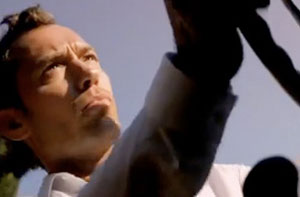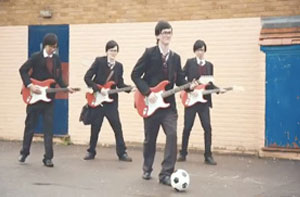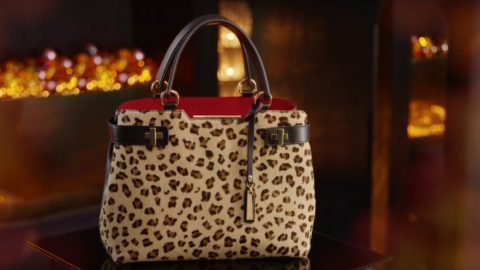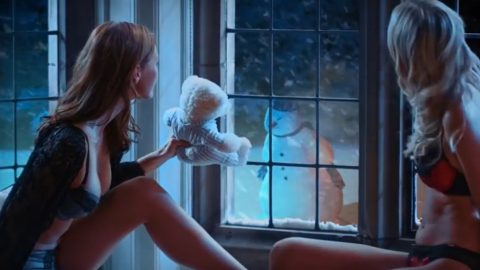
Dior - Homme Sport
It is generally considered that The Beatles invented the genre when George Harrison added a sitar to John Lennon’s already Dylanesque Norwegian Wood – side one track two of the moptops’ sixth album Rubber Soul released in December 1965.
However Top 10 chart positions earlier that year for moody 45s like The Kinks’ See My Friends and The Yardbirds’ Heart Full Of Soul offer a clear indication that the Fab Four were not the only bands on the block looking East for inspiration. Like many others, Ray Davies and Jeff Beck were also searching for timbres and textures that were, one way or another, ‘out there’ – even if they had to rely on traditional beat boom instruments to create them.
But it was The Rolling Stones who trumped them all in May 1966 with their epochal raga rock single Paint It Black. Recorded at RCA’s Hollywood studios as part of the Aftermath album sessions, this is the soundtrack which Dior is using for an exceedingly expensive Homme Sport fragrance ad starring Jude Law, a classic car and a motorboat filmed somewhere in the South of France.
Paint It Black was the Stones’ tenth UK single – and their sixth chart topper. Like predecessors (I Can’t Get No) Satisfaction and Get Off My Cloud, it showcased how far Mick Jagger and Keith Richards’ had developed their characteristic riff-based rather than chordal-based writing style. It also exhibited Bill Wyman and Charlie Watts’ awesome ability to sit on a groove and beat it into submission.
But it was what Richards describes in his biography as a ‘gypsy’ melody, faithfully shadowed by Brian Jones’ surprisingly fluent sitar, which ultimately sets the Oriental tone of Paint It Black. One of the finest two and a half, full tilt moments in the Stones’ history, it laid out a raga rock blueprint which was to be widely copied on both sides of the Atlantic in the years that followed. It also emerged as one of their most covered titles ever with the likes of Chris Farlowe, The Standells, Eric Burdon, The Residents, W.A.S.P. and even U2 among those who have lined up to take their turn at it.

Mattessons - You Must Be Hank Marvin
But who now remembers that it was first recorded by the recently departed Bert Weedon? Or that his record label Top Rank didn’t consider it worth releasing?
It was composed by wannabe pop singer Jerry Lordan who was signed to EMI’s Parlophone label. Finding himself on a tour bus with The Shadows, Lordan pulled out his ukulele and played Apache to bass player Jet Harris who in turn easily persuaded the rest of the group to cut the track at their next Abbey Road session.
And yet, even with Cliff Richard himself on bongos, producer Norrie Paramor didn’t share their enthusiasm for Apache and had relegated it to the B side of The Shads’ next single – in favour of a version of a Boy Scout campfire song The Quartermaster’s Stores – until, so the story goes, his daughter told him he was missing out on a hit. She was proved right, of course, as the track went all the way to Numero Uno, paving the way for a further 31 Top 50 hits in 21 years, all of which made The Shadows the world’s pre-eminent instrumental band.
Apache was a transatlantic hit too, but not for Hank and Bruce and co. EMI’s US partner Capitol declined to release their recording and so the way was clear for Danish guitarist Jorgen Ingmann to take the track to number 2 in the Billboard charts on Atco in 1961. Apache then became a set list staple for just about every surfing instrumental band ever and was recorded by a fair few of them too – most notably The Ventures in 1962 for Dolton.
But it wasn’t just white Americans who fell for Lordan’s siouxsome stomper. In the ‘hood, maverick magpie hip hop DJs like Afrika Bambaataa got into it through an obscure 1973 big band jazz rock version by The Incredible Bongo Band (MGM) which featured an elongated drum passage simply crying out for a good sampling. Then The Sugarhill Gang went the whole hog and took their take on the Bongo Band’s song, complete with added rap, into the lower end of US charts in 1981 – from whence the song has become an urban anthem courtesy of dancefloor denizens like Sir Mix A Lot, Grandmaster Flash, MC Hammer, Fat Boy Slim and too many more to mention.
Quite coincidentally, it’s The Sugarhill Gang who feature in the last TV ad we’re looking at this month – which the latest in the always cheerful spots Asda commissions for its clothing range George. Only a couple of months ago it was Manfred Mann’s 54321 which caught our ear. This time it’s Rapper’s Delight, the debut release by the New Jersey trio of Wonder Mike, Big Bank Hank and Master Gee who recorded for the late legendary A&R woman Shirley Robinson’s Sugarhill Records (http://tinyurl.com/83z2m72).

George @ Asda - Rapper's Delight
Rapper’s… may not have been the first hip hop record ever but it was certainly the first to make the charts, peaking at number 36 in the US and number three over here in 1979. Based on Chic’s Good Times, it should have made the three man Gang a small fortune. Sadly though, they’d sampled the original track without permission and so were sued for their sins by writers Nile Rodgers and Bernard Edwards. You can guess the rest of course. Rapper’s Delight must be one of the most popular hip hop tracks of all time but The Sugarhill Gang only ever get to see a tiny fraction of what it earns.
Welcome to the Industry of Human Happiness! – to coin the phrase first used to describe the pop music business by The Stones’ manager (and Paint It Black’s producer) Andrew Loog Oldham in 1965.
Courtesy of Record Collector











